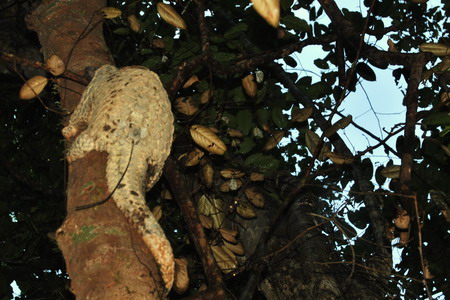
Conservationists have released a Sunda pangolin into Cat Tien National Park and for the first time, will monitor it to make sure it acclimates properly.
Five more Sunda pangolins rescued from smuggling rings will be released into the park – located 150 kilometers from Ho Chi Minh City - after the scaly mammals responded well to a rehabilitation program conducted by the Carnivore and Pangolin Conservation Program (CPCP), a program run by Cuc Phuong National Park in northern Vietnam.
Conservationists have released a Sunda pangolin into Cat Tien National Park and for the first time, will monitor it to make sure it acclimates properly.
Five more Sunda pangolins rescued from smuggling rings will be released into the park – located 150 kilometers from Ho Chi Minh City - after the scaly mammals responded well to a rehabilitation program conducted by the Carnivore and Pangolin Conservation Program (CPCP), a program run by Cuc Phuong National Park in northern Vietnam.
The animals had been seized from smugglers on different occasions.
This is the first time in Vietnam that a project will monitor the survival and movements of a pangolin released into the wild and it is hoped the process will make way for future release programs which aim to bolster the depleted Sunda pangolin population, CPCP said in a press release on May 3.
Rehabilitating pangolins seized from smugglers is a notoriously difficult process, but it made possible in this instance thanks to husbandry guidelines developed under the program.
Rescued pangolins are often found dehydrated, malnourished, plagued by parasites and trap-related injuries. The mortality rates are high for rescued pangolins placed in captivity.
In addition to the one already released, the five other pangolins which responded well to the CPCP rehabilitation program will soon be released one at a time into Cat Tien National Park.
The first animal spent the last month acclimatizing in Cat Tien as its feeding habits, weight and activity patterns were monitored.
The animal was taken to a pre-selected release site within the park, an area of dense primary forest with sufficient resources – ant nests, termite mounds and tree hollows – to support a pangolin population.
Daily food provisions are being left daily for the animal for first two weeks.
“Reintroductions of confiscated pangolins have previously been conducted by forest rangers; however, this is without comprehensive heath checks and follow-up monitoring. The success of this release method remains unknown and there is a risk that the animals may transmit disease into wild populations,”said CPCP program manager Tran Quang Phuong.
The Sunda pangolin is listed in the IUCN Red List as being “Globally Threatened-Endangered.” It is one of the most exploited mammal species in Southeast Asia. The species is hunted for local demand for wild meat, while its scales and skin are used in traditional Chinese medicine.

 Previous page
Previous page Back to top
Back to top







